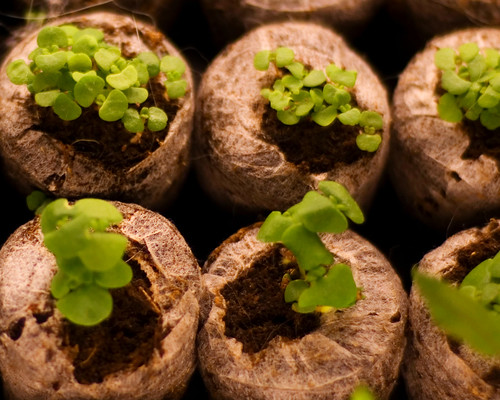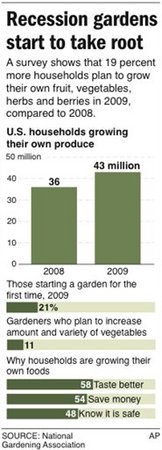Archive for March, 2009
Welcome to SuburbanHomesteading.com!
Every day we are bombarded with bad news about the economy, layoffs, and financial crisis – the negativity is overwhelming. As many of us juggle to make ends meet, we hear more and more that people should simplify, become more self-reliant, more self-sufficient, even become modern day homesteaders. But what does that mean? How does a normal suburban family make it all work on a very normal sized city or town lot?
That’s what SuburbanHomesteading.com is all about – learning to become modern day homesteaders right where we live.
You’ll not only discover how suburban families can live this newly emerging lifestyle, you’ll also discover information, resources, tools, links, products, recommended books and lifestyle guides that can help make this lifestyle a reality…plus so much more as you visit the various pages of our site.
But, before you “dig in” to SuburbanHomesteading.com, we want to help you understand the new and sometimes confusing terms you’ll encounter — terms which are too often misunderstood.
Homesteading is a lifestyle of simple, agrarian self-sufficiency. ‘Homesteader’ applies to anyone who chooses to live a sustainable, self-sufficient lifestyle. ‘Suburban homesteading’, can be viewed as a simple living lifestyle, incorporating small-scale livestock raising and gardening, home food production and storage into suburban or city living.
Self-sufficiency or self-reliance refers to doing for one’s self and one’s family; not requiring outside help, support, or interaction for survival; it is a type of personal or collective independence.
Simple living or voluntary simplicity is a way of living that minimizes the all-encompassing (and often stressful) pursuit of wealth and consumption. It rejects the idea that ‘more-is-better’ and embraces the idea that you can have a better, more tranquil life with less. Voluntary simplicity is a way of living that is outwardly more simple and inwardly more rewarding — a way of “being” that brings our most authentic and alive self into conscious living.
As we launch ‘SuburbanHomesteading.com’ to serve the ever-growing population of modern-day homesteaders, I think back to the way previous generations lived and survived the difficult times in our nation’s history. With every major struggle, including the Great Depression, we, as individuals and families, have had to take steps to care for ourselves. I think about the Victory Gardens of WWI, the frugality during the Dust Bowl era and food rationing during WWII. Our citizens learned much during these times.
But, too often, we ignore the old ways; much to our peril.
SuburbanHomesteading.com won’t be a diary or journal or musings of my life, although you will see some references to what I am doing.
Rather, this site is all about YOU. It’s a place where you, the 21st Century Homesteader, can come for information, ideas, inspiration and encouragement as we all travel down an unknown path to an uncertain future.
None of us knows how long this current crisis or its aftermath will last, but what I am sure of is that each and every person who learns to take care of themselves and their family — who learns to focus on the positive and not dwell on the negative — will ultimately be better off.
My challenge to you as you enter this new realm of simplicity and calm is to focus on what’s truly important in your life – family, friends, your health and doing for yourself. Leave the ugliness of the outside world…outside. Make a new world for yourself, regardless of your situation. One that is serene and slow, enjoyable and beautiful in its simplicity. Step out of the fast lane and onto the slow path.
The Garden Boom has Begun

As the recession drags on, many Americans are getting “down-and-dirty” – literally – by cultivating vegetables in their own backyards. The double-digit increases in home gardening are also showing impressive savings for family food budgets…

“People’s home grocery budget got absolutely shredded and now we’ve seen just this dramatic increase in the demand for our vegetable seeds. We’re selling out,” said George Ball, CEO of Burpee Seeds, the largest mail-order seed company in the U.S. “I’ve never seen anything like it.”
Gardening advocates, who have long struggled to get America grubby, have dubbed the newly planted tracts “recession gardens” and hope to shape the interest into a movement similar to the victory gardens of World War II.
But for many Americans, the appeal of backyard gardening isn’t in its history – it’s in the savings.
The National Gardening Association estimates that a well-maintained vegetable garden yields a $500 average return per year. A study by Burpee Seeds claims that $50 spent on gardening supplies can multiply into $1,250 worth of produce annually.
Doiron spent nine months weighing and recording each vegetable he pulled from his 1,600-square-foot garden outside Portland, Maine. After counting the final winter leaves of Belgian endive, he found he had saved about $2,150 by growing produce for his family of five instead of buying it.
Adriana Martinez, an accountant who reduced her grocery bill to $40 a week by gardening, said there’s peace of mind in knowing where her food comes from. And she said the effort has fostered a sense of community through a neighborhood veggie co-op.
“We’re helping to feed each other and what better time than now?” Martinez said.
Read More on ways to save potentially thousands of dollars by growing your own.
![]() photo credit: HDC Photography
photo credit: HDC Photography
Recent comments
Aenean nonummy hendrerit mauris. Phasellus porta.